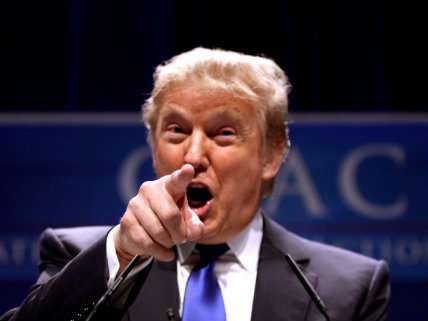Donald Trump Is Totally Incoherent On Health Care Policy Because Policy Is Irrelevant to His Campaign
His flip-flop on Obamacare's individual mandate is an admission that policy details don't matter.

Donald Trump made it very clear last night that he does not support Obamacare's individual mandate to purchase health insurance. Asked whether he supports mandates on the American people, Trump jumped in, cutting off Fox New host Sean Hannity to say, "No, I don't support them."
Less than a week ago, however, Trump felt very differently. Asked by CNN's Anderson Cooper about what would happen to the insurance market without the law's health insurance requirement, Trump said, "Well I like the mandate."
Last night's response was a follow-up on an early flip-flop, tweeting last week that he would "repeal all of #Obamacare, including the mandate, period."
The best way to understand this rapid change is not as a meaningful shift from one position to another. It's better viewed as an admission that he has no coherent position at all, and that the underlying policy details are utterly irrelevant to him.
This is always the case when Trump talks about health care. Figuring out what his actual policy preferences are is essentially impossible, and if you try to take all of his statements together, in some sort of context, you end up with what Philip Klein of The Washington Examiner recently described as a mix of "incoherence and socialism."
Trump has variously supported replacing Obamacare with a free-market system, covering everyone through a system paid for by the government, providing care to people using "the concepts of Medicare," allowing the government to use its buying power to negotiate with drug companies, instituting an ill-defined competitive bidding process even though one already exists in Medicare, and—if you are inclined to be generous—vague support for allowing insurance to be purchased across state lines. ("We're going to take the lines out of play.")
Even when he gestures towards a real policy idea, he does so in ways that suggest that not only does he not really understand the idea, he does not care to understand it. The details are irrelevant. If anything, displaying an understanding of the details might suggest that Trump had become too caught up in the compromises of governance that he claims he will be able to overcome as president.
The most consistent refrain in Trump's answers to health care is his declaration that "we're not going to have people dying in the streets," a line he sometimes repeats multiple times in a single response, as if America's streets were strewn with dead corpses. The line, of course, is not responsive to questions about how, exactly, he would replace Obamacare, or to any meaningful aspect of national health care policy. At best, it is reference to ensuring that people who cannot pay still have access to emergency care. But Trump's plan for what to do with people in such situations—"we're going to get them into a hospital and take care of them"—ignores that since 1986 the United States has required hospitals to take people regardless of whether or not they can pay, via the Emergency Medical Treatment & Labor Act. If he is proposing a policy, it is one that already exists.
But Trump is not really proposing policy, because for both him and his supporters, policy is utterly beside the point. Nothing that Trump says about health care or any other policy, from taxes to abortion to deportation, even when he seems to venture near to something resembling a policy idea, should be taken seriously as a policy proposal. Instead his words should be understood as expressive statements meant to reflect some broad sentiment that plays well with his supporters rather than descriptions of actual plans he intends to put in place.


Show Comments (100)